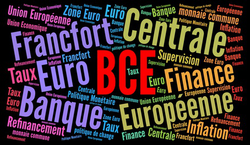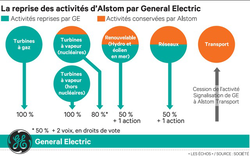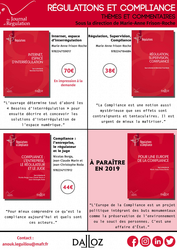The recent news
May 2, 2018
Teachings : Droit de la régulation bancaire et financière, semestre de printemps 2017-2018

L'Europe est avant tout et pour l'instant une construction juridique. Elle est avant tout et pour l'instant la construction d'un marché. Elle débuta pourtant par la construction d'un espace unifié du charbon et de l'acier. Mais cela s'arrêta. Et c'est le "simple" droit de la concurrence qui prît le relais. Celui-ci bloqua tout mécanisme de régulation. Notamment parce que celui-ci, même en matière financière et bancaire est de nature politique.
C'est pourquoi la première approche du droit communautaire en matière bancaire et financière fût d'abord jurisprudentielle, issue de la Commission européenne et basée sur le pur Droit de la concurrence, logiquement destructrice de la logique régulatrice de la logique bancaire et financière. La Directive sur les Marchés d'Instruments Financiers (MIF) eut pour objectif d'injecter de la concurrence dans les marchés de biens financiers afin d'accroître leur performance et la prospérité générale. Cette évolution juridique participa à la réalisation de la crise financière.
C'est pourquoi une nouvelle Europe est en train de se construire, en réaction aux crises financières de 2008, 2009 et 2010. Elle a de nombreux piliers. Elle est en cours d'élaboration. Elle vise les marchés financiers proprement dits à travers les nouveaux textes sur les instruments financiers et les infrastructures de marchés. Elle est achevée et va commencer à s'appliquer en matière de bancaire et - sur le papier à tout le moins - elle constitue une grande réussite : l'Union bancaire. Elle commence à se déployer dans des projets de textes tout azimuts, à travers le "plan pour l'Union des marchés de capitaux".
A travers ce qui serait une nouvelle Europe, celle-ci viendrait en face, ou au-dessus, de l'Europe de la Concurrence.
En effet, l'Europe de la Concurrence, qui fût conçue davantage par la Commission européenne que par les fondateurs de l'Europe - dont le projet était quant à lui politique , s'ouvre à un projet industriel, puisque les marchés de capitaux (plan d'action) ont pour but capitaliste de permettre à des entreprises petites et innovantes d'avoir les moyens de se développer. Ce sont donc trois objectifs qui s'articulent. L'Union bancaire a pour objectif de prévenir et de gérer le risque systémique. Le Plan d'action de l'Union européenne pour une Union des marchés de capitaux vise à offrir aux entreprises européennes des capitaux d'une façon accrue. La Régulation européenne des marchés financiers a pour but de consolider les marchés financiers en tant que tels (en cela, elle concourt à la fois à prévenir le risque systémique et elle concourt au financement des entreprises).
Accéder aux slides servant de support à la leçon sur la construction juridique de l'Europe bancaire et l'Europe des marchés de capitaux.
Consulter le plan de la leçon sur La construction juridique de l'Europe bancaire et de l'Europe des marchés de capitaux
Retourner au plan général du cours.
Retourner à la présentation générale du Cours.
Consulter le Dictionnaire bilingue du Droit de la Régulation et de la Compliance.
Consulter la bibliographie générale du Cours.
Voir bibliographie élémentaire et approfondie ci-dessous.
April 28, 2018
Blog

La presse américaine raconte l'incident. Dans l'article publié par le journal Politico, le titre est "English only ?Try Au Revoir".
Le 25 avril 2018, se tient une réunion pour organiser les discussions autour du budget de l'Union européenne, qu'il convient de réorganiser du fait du Brexit.
En outre,et précédemment Emmanuel Macron avait souligné dans son discours devant le Parlement européen la volonté de la France d'accroître son effort budgétaire pour permettre à l'Union européenne d'exprimer sa "souveraineté".
Lors de la réunion, le secrétariat du Conseil de l'Union signale que "pour aller plus vite et pour être plus efficace", les discussions au sein du groupe qui va discussion de cela ne se dérouleront qu'en langue anglaise.
Le Représentant permanent de la France auprès de l'Union européenne, Philippe Léglise-Costa, a estimé que cela n'est concevable et a quitté la réunion d'organisation.
La presse reprend la dimension diplomatique de l'usage de la langue. Ainsi que sa dimension institutionnelle, car la langue française est une langue officielle de l'Union européenne. Et c'est la langue officielle de la Cour de Justice. Ainsi, lorsqu'on reprend les règles linguistiques de la Cour, on peut retrouver la règle : "La Cour a besoin d'une langue commune pour délibérer. Cette langue est traditionnellement le français. Toutes les pièces déposées par les parties dans la langue de procédure sont ainsi traduites en français pour constituer un dossier interne de travail.".
Lorsqu'il s'agit de l'élaboration des textes par lesquels l'Europe se construit, le Français est une des 24 langues officielles.
C'est une règle de Droit. Elle renvoie à une dimension politique : l'Europe est un espace dans lequel il peut y avoir une unité parce qu'il y a un respect de la culture de chacun et notamment de sa langue.
Le fait que chacun maîtrise en outre la langue anglaise est un fait. Cela n'est qu'un fait. Et Emmanuel Macron en est le meilleur exemple. En tant qu'il est le Président de la France, c'est en langue française qu'il s'exprime lorsqu'il fait un discours devant le Parlement européen.
En outre, le Droit lui-même n'est qu'un ensemble de mots, et l'obligation de suivre ce qui disent ces mots (l'obligation d'obéir aux prescriptions du Législateur, du Juge ou des contractants) n'est pas la caractéristique du Droit. Car c'est plutôt la caractéristique de l'Etat, avec lequel l'on confond trop souvent le Droit, dont le chapeau du gendarme n'est que le "signe" et non pas la définition.
En cela, le Droit exprime une culture. Ainsi le Droit français utilise la langue française et renvoie à la civilisation française. Même s'il n'y a pas une intention de le faire, par nature il le fait. L'on n'en a pas toujours conscience parce que l'on confond le Droit et ce qui ne serait qu'une "réglementation" à propos de laquelle il ne s'agirait que de faire "vite et efficacement"!footnote-1168 comme l'a proposé ici le secrétariat du Conseil.
Si l'on utilise la langue anglaise, alors même s'il n'y a pas d'intention malicieuse (et l'on va poser qu'il n'y en a pas), alors par nature c'est à la culture juridique britannique (Common Law), et à travers elle à la culture anglo-saxonne que le renvoi s'opère.
Alors même que dans le cas présent, il s'agit de se réorganiser parce que le Royaume-Uni a quitté l'Union européenne. Alors même que la France est plus que jamais impliqué dans la construction d'une "Europe souveraine".
Mais parce que la France aujourd'hui défend et l'Europe dans son lien avec la culture, et le Droit dans ce qu'il est tout autre chose de la réglementation, aujourd'hui par la personne de son ambassadeur a fait ce qu'il convient : quitter la table si la langue française n'y est plus.
April 27, 2018
Blog

Le Conseil d'Etat a rendu public son Avis : avis du 12 avril 2018 sur le projet de loi de programmation sur la justice.
Parmi les très nombreuses dispositions de ce projet de loi de programmation et de réforme de la Justice", aussi abondantes que variées et que disparates, figurent un pan consacré aux peines.
Puisqu'il s'agit du Droit pénal, l'exigence de précision dans les termes est plus grande encore, impliquée par les principes constitutionnels de nécessité et d'interprétation restrictive.
Le titre qui donne de la cohérence aux dispositions en la matière est de "renforcer l'efficacité et le sens de la peine".
Le "travail d'intérêt général" peut être notamment effectué au sein d'une personne morale de droit privé chargée d'une "mission de service public" habilitée, que son but soit lucratif ou non .
Au regard des garanties constitutionnelles et internationales concernant le travail forcé, le Conseil d'Etat estime que la notion de "personne morale de droit privé chargé d'une mission de service public" est suffisamment explicite pour que les garanties soient satisfaites, dès l'instant que les décrets en Conseil d'Etat détermineront et les conditions de l'habilitation de ces personnes morales habilitées et les conditions de l'activité à laquelle la personne est condamnée.
Mais le projet de loi avait également visé "l'entreprise engagée dans une politique de responsabilité sociale de l'entreprise".
Et cela n'a pas été agréé par le Conseil d'Etat, non pas tant qu'il récuse l'idée d'une extension entre "l'intérêt général" et "l'intérêt collectif", mais qu'à juste titre soucieux de la pulvérisation des définitions des sortes d'intérêts que toutes sortes d'entités poursuivent, il demande à ce que celle-ci s'ancre dans ce qui serait la définition de référence : la loi du 31 juillet 2014 relative à l'économie sociale et solidaire.
Voilà les termes exacts de l'Avis (p.30) :
- En ce qui concerne l’identification des personnes morales pouvant proposer un travail d’intérêt général
107. Le Conseil d’Etat estime que la notion utilisée par le législateur de « personne morale de droit privé chargée d’une mission de service public » est suffisamment explicite et qu’il n’est pas nécessaire d’y ajouter la mention particulière d’une catégorie de personnes comprise dans cette notion. S’il le juge utile, le Gouvernement dispose d’autres moyens pour informer les personnes en cause de la portée du dispositif prévu à l’article 131-8.
- En ce qui concerne le champ de l’expérimentation
108. Le Conseil d’Etat propose de substituer à la notion, imprécise, d’« entreprise engagée dans une politique de responsabilité sociale de l’entreprise » celle, différente, de « personne morale de droit privé remplissant les conditions définies par l’article 1er de la loi n° 2014-856 du 31 juillet 2014 relative à l'économie sociale et solidaire et poursuivant un but d’utilité sociale au sens de l’article 2 de la même loi ». En effet, la catégorie de personnes morales de droit privé visée par cette nouvelle rédaction est à la fois mieux définie et plus adaptée à l’utilité sociale des travaux pouvant être proposés, conformément à l’objectif recherché par le Gouvernement. ......
Lire le commentaire ci-dessous.
April 17, 2018
Teachings : Sectoral Regulation Law

On affirme souvent la nécessité de "réguler le numérique" et la part que le Droit prend dans cette perspective.
Mais cette idée même n'est pas aisée ni à admettre ni à cerner.
Cette difficulté tient au fait que le numérique est aujourd'hui difficile à appréhender comme un "secteur", alors même que le Droit de la régulation est né de cette idée simple et efficace selon laquelle un secteur produit un Droit qui lui est spécifique. Cela fût pourtant pratique au départ, la régulation du numérique prenant racine dans le Droit de la régulation de la puissance numérique, l'une des premières régulations mises en place en 1978 (en France comme en Allemagne). Ce lien reste actif, comme le montre la jurisprudence Safe Harbor. L'espace numérique est également en lien avec les télécommunications, il continue à puiser dans le Droit de la régulation des télécommunications ; de la même façon, étant en lien avec l'audiovisuel, il continue de puiser dans le Droit de la régulation de l'audiovisuel. Il en résulte une interrégulation entre les régulateurs des ces secteurs-là, voire une compétition entre eux. On retrouve d'une façon plus aiguë qu'ailleurs la question du contenu et du contenant : le numérique doit-il être régulé en fonction de ce qui s'y déroule, de ces images, de ce qui y est dit ? Plus encore, si l'on doit considérer que le numérique correspond au "monde virtuel", la régulation de celui-ci doit-elle s'enfermer dans ce monde-là, qui serait une nouvelle "civilisation" ou doit-elle au contraire opérer une nouvelle connexion avec ce qui est appelé parfois, et par le Législateur lui-même, "l'économie réelle" ?
Dans une telle incertitude et devant de tels enjeux, il y a pourtant de nombreux candidats pour réguler le numérique. Le premier sont les opérateurs eux-mêmes. Parce qu'ils ont construit ce moteur et le transforment à chaque instant, parce qu'en ont les mêmes contours et la même ampleur. En ont-ils la légitimité et pourront-ils le faire ? On voit apparaître d'une façon pure ici le lien entre le Droit de la Régulation et la Confiance, comme socle de celui-ci.
Mais l'idée de réguler le numérique n'est pas même acquise ni définitive. En effet l'espace numérique s'est construit sur l'idée de liberté. Or, la Régulation est liée à une vision de schémas posés Ex Ante. En cela, réguler le numérique, c'est en briser l'idée. Sauf à trouver, notamment par le contrat, un instrument juridique qui corresponde à cette idée profonde. Mais il faut alors que le contrat lui-même arrive à se charger d'autre chose que des intérêts des parties. Est-ce que le Droit de la Régulation peut l'obtenir ? Peut-être à travers son évolution qu'est le Droit de la Compliance. En outre, la Régulation du numérique peut prendre la forme non pas tant de réguler des libertés ou des droits, mais des "titularités", ici des titularités des "données", or virtuel du numérique qui enrichit pour l'instant les intermédiaires de cet espace-là. Cela n'est pas définitif et le Droit n'a encore que peu parlé à ce propos. le Droit pourra intervenir en renouvelant ses catégories mais encore, comme le fait d'une façon plus générale le "Droit économique" en abordant les situations d'une façon plus archaïque : en s'opposant aux puissances, perspective dont naquit le Droit de la concurrence.
Le Droit de la Régulation du Numérique reste encore à construire.
Consulter les slides servant de support à la leçon sur l'idée même de réguler le numérique.
Revenir à la présentation générale du Cours.
Consulter la bibliographie générale du Droit commun de la Régulation
Consulter le Dictionnaire bilingue du Droit de la Régulation et de la Compliance
Consulter la bibliographie ci-dessous spécifique au Droit de la Régulation du numérique.
April 16, 2018
Blog

It is about a particular case that one can rephrase the general questions. If the case is hot, it is even more important to return to the general questions, which are always colder (more boring, too).
Thus, Cambridge Analytica is a case of which everyone speaks a lot ... It is at the same time particular and very burning.
So we talk about it a lot, and with vehemence, and in a way often definitive, as well in attack as in defense.
For the prosecution, there are many advocacies, gathered for example in the Guardian's files.
For the defense, we find less. But one can read for example the article that has been published in early April 2018: Why (almost) everything reported about the Cambridge Analytica Facebook 'hacking' controversy is wrong.
The number of comments, and their more or less inflamed nature, in any case always definitive, does not mean anything in itself.
The regulators took the floor a little later, both in a more concrete way, the "group of 29" (bringing together all the European Regulators personal data) establishing the 11 April 2018 a working group on this subject and publishing April 10, 2018 new guidelines on the place that must be made to "consent".
But for the moment, if we loof at the media, it looks like a trial, because everyone claims to be entirely right and pretends that the other is entirely wrong. Trial to break the truth and virtue, say the accusers. Trial in witchcraft, says Facebook. And it's always up to us.
Because all this is probably due to the fact that we are no longer spectators: we are placed in the judge's position. The financial market was the first judge. It has already condemned. Without really trying to find out. This is because the public good of the financial markets is Trust, it is enough that one can even suspect the wife of Caesar, and so it is not really matter of truth of the facts and goof application of Rule of Law.
For the public opinion that we are, this is something else, because we could wait to know more. And we should, since we seek to remain a little attached to the "truth " of the facts and respect for the Rule of Law. However, this case is complex and is above all a matter of judicial analysis which will come and which we cannot lead ourselves, both in terms of the facts-which are complex-as well as the rules of law to be applied which are equally so.
What turns us into a court, an ordinary sociological phenomenon, is a new legal mechanism: the "whistleblower". By nature, it gives the bonus to the Attack
This logic of the legal mechanism of the whistleblower, a movement of fact to throw facts as one throws a buoy outside but one could also say stones on the firm that the insider denounces, logic today encouraged and protected by the Law, allows a person who knows something, most often because he participated, to let everyone know, without a filter. To denounce it. For the public good..
The successive texts on the whistleblower are nrms of a Compliance Law!footnote-1129 which seek, in particular in French Law, to ensure a balance between this "monumental goal"!footnote-1130 which is the respect of the truth, the fight against corruption, the protection of human beings, etc., and the risks to be endured by the company thus denounced.
The case is exemplary of this, since Facebook is "denounced" only in second place, behind Cambridge Analytica, but the notoriety and power of the first makes that it is hit first. French law in the so-called "Sapin 2 Act " of 2016 has ensured to protect the company denounced, but British and American Law are more violent, probably because they encourage more the private enforcement.
Temporality is therefore favorable to the attack. The time of the defense is always slower. It is usually the people in situations of weakness who suffer it: slowness of justice, justice outside courthouses, etc. With Compliance mechanisms, it is probably the very powerful who will live this. It is not a matter of rejoicing: the misfortune of some (here the difficulty of a company hasty "judged") does not console in any way the misfortune of others (the difficulty of ordinary beings accused or having only the right to protect themselves to reach concretely a judge and really get a judgment executed, even as they are in their right).
But if we go to general questions, since on the facts of this case we don't have the means to appreciate them, nor on the rules which apply to them, we cannot apply them in an adequate way until a court will have exercised its office?
However, the general perspectives highlighted by this singular case are two orders: Probationary order (I) and Accountability order (II).
Read below.
April 13, 2018
Blog

The sale of Alstom to General Electric is an economic, political and legal affair.
Intervened in 2014, in France it is today rather told "for the prosecution".
Those who participated are now on the defensive; in April 2018, it is in the field of "probity" that they defend themselves, terminology which is that of the Compliance Law, vocabulary chosen by the French legal system ("Sapin 2" Act of 9 December 2016)!footnote-1157.
Compliance has therefore appeared as a kind of aggression and it is in this way that many French observers are presenting it. In the Alstom case, Compliance is at its worst : as a means of pressure used the U.S. to obtain, in the conditions most convenient for them, the sale of control of the strategic Alstom company.
In this case where it is sometimes difficult to discern the true from the false, the fact of the advocacy, the concern for the truth of the political discourse a posteriori, it is certain that the action of the States interfered with the pretensions of the companies and that it is through a sale of a business in which it was also necessary to take into consideration interests of a different nature from economic and financial interests, not only the general interest but the particular interest which is the interest of a Nation : here the interest of France.
That the United States wanted to reach their own interest on one hand, and on the other hand that the other State needs and wants to preserve it - through the legal mechanisms such as the merger control, this is not to blame per se. Indeed, on the one hand the activity in question, namely the manufacture and sale of turbine for nuclear power plants are crucial activities and directly concern the States and on the other hand a State, here the French State French is legitimate to worry about some companies!footnote-1152.
It can be considered that if it did not, if the French Government in 2014 did not care to defend the energy sector (general interest) and the interest of France (interest of the country) , only worrying about the economic and financial dimension of the operation, then that is to blame. This is supported by the criticisms made today. This is denied by the people who were negotiating for the company and for the French State at the time.
It is indeed this double dimension of national interest and general interest that we find in the French Decree of May 14, 2014 relating to foreign investments subject to prior authorization, the Décret du 14 mai 2014 relatif aux investissements étrangers soumis à autorisation préalable , called "Montebourg", text adopted then and which is legally legitimate because it gives the State the power to defend its own interests.
_____
But let's look at this case in the perspective of the Compliance Law, and first of all on the side of American Law.
Can we blame the Americans for using the prospect of sanctions of the French company Alstom to encourage the shareholder of the latter, namely the French State to hand over control of the company to General Electric, buyer suitable for US public authorities?
It is not legitimate to do so because the American Compliance Law gives US public authorities the legal power to prosecute and punish foreign companies when there is evidence to suggest that they are likely to be liable for corruption!footnote-1154.
One can certainly rant about the fact that this extraterritorial power of legal action is not only objectionable in itself but in fact is used more against European companies than against Chinese companies, and that in the case it was used (and strongly) against a company whose US wanted a transfer of technology and control!footnote-1155.
But the French company had given the baton to be beaten: if corruption had not been likely occurred, then the US authorities could not have deployed the force of this legal weapon.
Admittedly, everyone replies: "be realistic, everyone corrupts, it's the real norm of the world!" Well, if it is so, it is right to change this sort of law of the world. To replace it with another principle: the principle of Probity.
Because it allows to move to the second perspective of the Compliance Law, on the side of French and European law.
Indeed, if it went wrong, if the negotiations were unbalanced because the United States took advantage of the otherwise applicable Law and held Alstom accountable for corruption, including by imprisonment, this which has had the effect, no doubt, of weakening the interlocutor in the negotiations, is also due to the fact that Europe does not demand accountability from companies which, no doubt, commit acts of the same type.
The solution is not in the United States' stop of their behavior, because it is not clear why they would do it and in the name of what they would be asked to no longer apply a lawful and applicable legal requirement against corruption. The extraterritorial scope of their legal system will not diminish: if the criterion of a use of their currency was losing its force, for example by the use of a currency other than the dollar, the use of a means of digital communication would suffice to produce the legal attachment giving them competence. And who does not send emails by Gmail? does not used a data by Outlook? does not transfer a photo by Apple?
A first solution could be in the cessation by the French and European companies of behaviors that make them amenable to such legal mechanisms. If that were not possible in fact, because it would be accepted that corruption is the real norm of the world (but then it would be a little less to proclaim the glory of business ethics and other Corporate Social Responsibility or to at the very least, not be surprised if one finds that some people are singing false!footnote-1156, and even if this is indeed possible and because it is necessary by the Law to tend to this, because the breaches of probity do not neither economically nor ethically desirable, Europe needs to have the same legal capacity to hold any company accountable in this Compliance area.
When the Alstom case unfolded, French Law did not allow it.
But since French Law has evolved.
By the so-called French "Sapin 2 Act" and precisely in reaction to this power that the United States derives from their legal systeme, France has adopted a legal mechanism which, thanks notably to the Agence Française Anticorruption -AFA (French Anti-Corruption Agency), is more offensive than its American model!footnote-1158.
What the Alstom case showed is this: for the moment, Europe is destitute, we must de jure and de facto construct the Europe of Compliance.
_____
April 11, 2018
Teachings : Droit de la régulation bancaire et financière, semestre de printemps 2017-2018

La Compliance, ne serait-ce que par ce terme même, est un mécanisme nouveau dans les systèmes juridiques européens, venant en convergence du Droit de la concurrence, du Droit financier et du Droit du commerce international.
Pour en mesurer l'importance et le développement, qui ne font que commencer, le plus probant est de commencer par sa dernière manifestation, à savoir la promulgation en France le 9 décembre 2016 de la loi dite "Sapin 2", suivant de peu la loi du 21 juin 2016 sur les abus de marché et suivie de peu par la loi du 27 janvier 2017 sur le devoir de vigilance des sociétés mère.
Voir l'ensemble de la bibliographie sur "Le Droit de la compliance"
Accéder aux slides servant de support à la leçon sur le Droit de la Compliance.
Consulter le plan de la leçon sur le Droit de la Compliance.
Retourner au plan général du cours.
Retourner à la présentation générale du Cours.
Consulter le Dictionnaire bilingue du Droit de la Régulation et de la Compliance.
Consulter la bibliographie générale du Cours.
Voir bibliographie élémentaire et approfondie ci-dessous.
April 8, 2018
Blog

La presse générale s'en émeut grandement aux Etats-Unis.
Par exemple le Times.
En effet, la Constitution est ce qui fait l'unité du Peuple américain, alors même qu'il s'agit à la fois d'une structure politique fédérale et d'une société à la fois divisée racialement et fondée sur des communautés. Cette unité autour de la Constitution a été soulignée notamment par Hannah Arendt qui disait en 1973 qu'arrivant d'Europe, lieu des Etats-Unis, elle était avant tout frappée par cette unité autour de la Constitution, "document sacré", ce qui est difficile à comprendre pour un étranger, car c'est la Loi qui règne et non pas les hommes".
Décrivant le système politique libéral américain, John Rawls souligne de son côté que chaque communauté devait vivre selon ses propres règles (à chacun selon son petit contrat social, en quelque sorte), l'unité se faisant autour de quelques principes et droits unifiant l'ensemble : la Constitution.
Il est donc acquis qu'aux Etats-Unis, s'il y a quelque chose qui est "pris au sérieux" pour tous, qu'il soit citoyen ou Président, c'est la Constitution. Elle est l'intangible du système.
Les amendements qui y furent apportés font partie du bloc de constitutionnalité : le second amendement confère à chacun le droit constitutionnel de porter une arme, expression de son droit fondamental de se défendre son espace de liberté.
L'État du Massachusettsa adopté une loi pour interdire le port d'armes mais a limité le champ de cette interdiction à une seule catégorie d'arme : les "armes d'assaut".
Cette loi étatique a été attaquée en alléguant une contradiction prétendue avec la Constitution et plus particulièrement le second Amendement de celle-ci. Le 5 avril 2018 le juge fédéral saisi d'une telle prétention a rejeté celle-ci en affirmant qu'une loi interdisant le port d'armes d'assaut ne méconnaît pas le droit constitutionnel du libre port d'arme.
Pour bien l'expliquer, l'attorney general de l'Etat du Massachusetts a donné une conférence de presse pour poser de vive voix comment le juge avait résolu cette "simple question" :
https://www.facebook.com/NowThisPolitics/videos/1998062733558540/
Comme le dit l'Attorney General, "I dit my job", c'est-à-dire utiliser le Droit pour atteindre le but, ici protéger les personnes (les préserver de la perspective d'être abattues par une personne utilisant contre elle une arme à d'autres fins que celle de se défendre) en demandant au juge qui dit la Constitution, c'est-à-dire le juge fédéral.
La "simple question" reçoit donc une réponse en fonction de l'interprétation et de la qualification de la situation que vise le Second Amendement.
____
Cela montre que si l'on veut limiter les effets délétères des armes aux Etats-Unis et faire échec aux multiples lobbies de l'industrie des armes qui s'exercent aussi bien sur les tribunaux que sur le Congrès, l'on doit non seulement espérer dans un Législateur qui en ait le courage, comme le demanda le Président Obama, dans une culture de la "régulation du port d'arme venant faire l'équilibre entre les libertés des uns et la protection des autres", mais encore dans ce que le pouvoir d'interprétation de la Constitution elle-même.
L'on retrouve ici une question très classique : comment faut-il interpréter la Constitution américaine ?
Il demeure acquis que le droit de porter une arme est un droit fondamental, que la Cour suprême protège.
Elle le fit notamment dans un arrêt essentiel de 2010, qui a interdit non seulement au Congrès de limiter ce droit, mais encore aux autorités locales et étatiques. Cette jurisprudence pourrait être remise en cause, non pas frontalement mais par l'art qui caractérise le Common Law : l'art de la "distinction".
En effet, la question est de savoir s'il ne faut pas "distinguer" parmi les "armes".
Il faut mais il suffit de se demander quelles étaient les "armes" que les pères fondateurs de la Constitution avaient à l'esprit lorsqu'ils ont conféré ce droit, en tant qu'il exprime le droit de tout citoyen de se défendre et d'exprimer ainsi sa liberté.
Dans les disputes célèbres entre Justice Scalia et Justice Breyer, que l'on soit comme le premier un adepte de l'interprétation "originaliste" de la Constitution, ou que l'on soit comme le second un adepte de l'interprétation "progressiste" de celle-ci, l'enjeu est toujours le même : que veulent dire les mots, puisque le Droit est un art pratique dont les éléments sont le langage!footnote-1151.
L'idée qui est ici retenue est que les armes qui ont été visées par les père fondateurs étaient des armes que les citoyens avaient à portée de main, qui faisaient partie de leur vie quotidienne. Pas les "armes d'assaut", qui soient des armes de guerre qui sont empruntées à un autre monde : celui de la guerre.
Dès lors, que l'on soit "progressiste", c'est-à-dire de ceux qui interprètent la Constitution en imaginant ce que les pères fondateurs auraient dit s'ils vivaient aujourd'hui, ou que l'on soit "originaliste", en se limitant à ce qu'ils ont voulu à l'époque, on en arrive à la même conclusion : les "armes d'assault" n'étaient pas dans leurs visées (conception originaliste) et ne seraient sans doute inclus dans ce qu'ils auraient conçu comme un continuum entre la liberté de l'individu et le port d'arme. Car il s'agit de se défendre et non pas d'abattre des dizaines de personnes par des armes de guerre. Il s'agit de se défendre et non pas de faire la guerre.
Dès lors, la notion juridique d' "arme" se divise par une "distinction" en deux catégorie juridique : la première qui demeurerait constitutionnellement protégée par le 2ième Amendement, intouchable par le pouvoir législatif, fédéral et local, en tant qu'elle permet à l'individu de "défendre" sa liberté, et la seconde qui, relevant de l'activité guerrière et d' "attaque", laquelle peut être limitée.
L'art de distinguer et de créer des catégories, voilà l'art pratique du Droit.